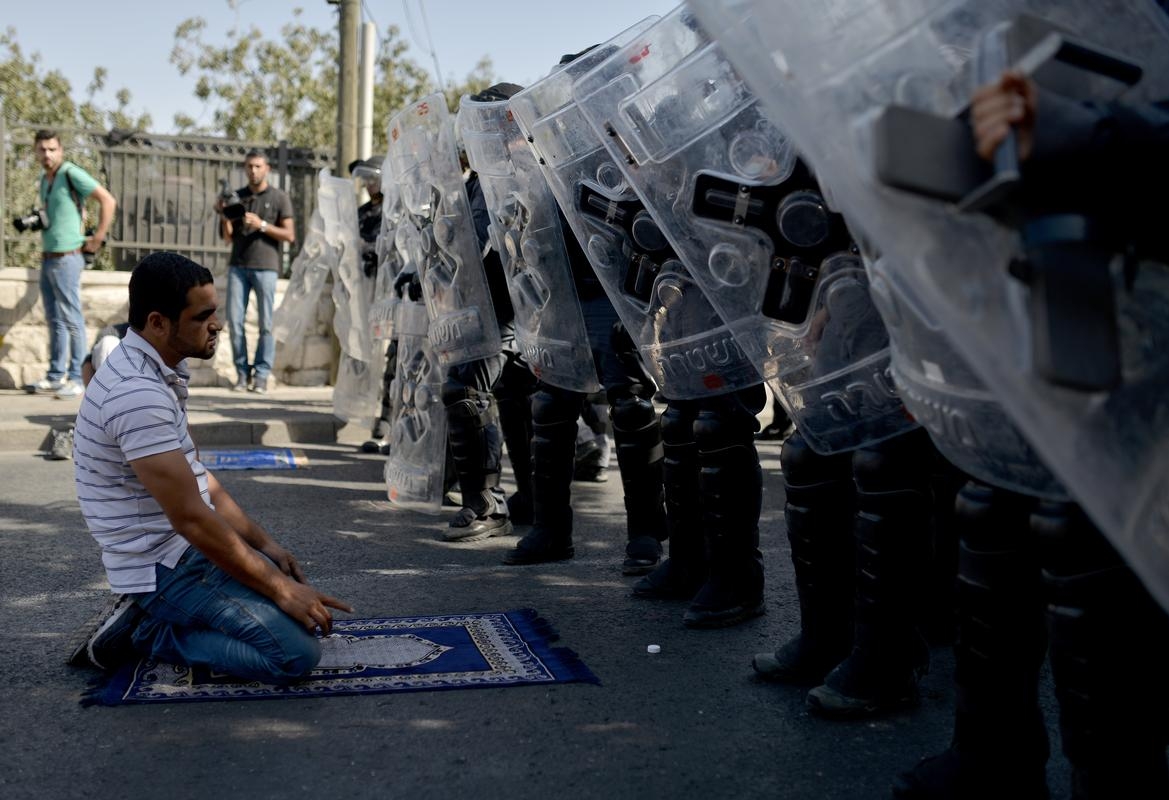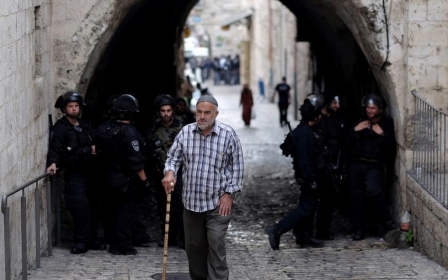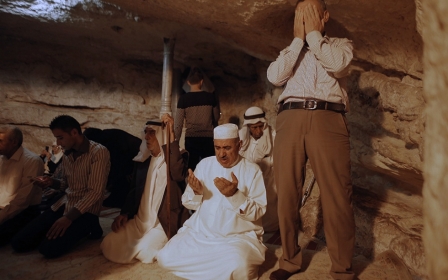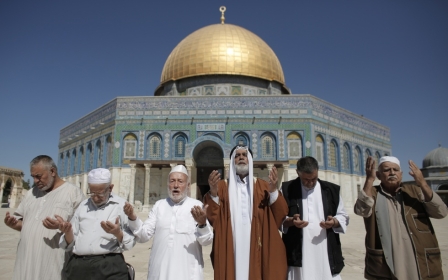Gaza rises for al-Aqsa Mosque

GAZA CITY - It is an unusually emotional moment for the imam at Al-Bara mosque in Gaza City, where Friday sermons are typically inspired by the everyday realities of what is happening in Gaza, on the ground and around Palestine. This week, al-Aqsa mosque in Jerusalem’s old city was the topic.
The imam called on the people of Gaza to take to the streets following Friday prayers to garner support for the mosque, where Israelis are denying access to Palestinian men under the age of 50. One thousand Israeli soldiers are creating a tense environment, and some clashes have occurred this week.
Hamas leaders also called on Gazans to take to the streets at a moment in time when popular sentiment and participation were expected to be huge. Other factions such as Islamic Jihad were also present at the exhibition of green flags and chants, promising to defend al-Aqsa, a site where frequent tensions occur.
"The Arabs who are not acting seem to have their eyes blinded and dignity removed from their blood when they see what is going on, in Jerusalem, and remain silent,” the iman cried.
"This is the disgraceful silence of Arabs," said the imam with a thundering voice, calling on the hundreds of participants within the mosque to take action and create more awareness about Israeli attempts to destroy al-Aqsa mosque.
"Al Aqsa is in danger," he said, calling on people to educate their children on the importance of al-Aqsa to Palestinians and all Muslims around the world.
For Muslims, al-Aqsa Mosque represents the world's third holiest site. Jews, who refer to the area as the "Temple Mount," say it was the site of two prominent Jewish temples in ancient times and is considered the holiest site in Judaism.
A massive demonstration of crowds listened to Hamas leader, Ismail Radwan, as he stated that Israel was attempting to divert the world’s attention away from what they are planning at al-Aqsa.
"The situation in al-Aqsa mosque and Jerusalem has reached a dangerous level of Judaisation where the occupation is taking advantage of other states - presently busy with their own internal affairs - in order to conduct its schemes by destroying al-Aqsa mosque and building its alleged temple," he said.
Radwan instructed Palestinians protesting inside of al-Aqsa to maintain the protest within the premises while inviting people to head towards Jerusalem to defend the first Qiblah (al-Aqsa).
Many of the people in attendance at Friday’s demonstration of solidarity expressed anger at the way Palestinians have been treated and used social media to voice sentiments in relation to the ongoing al -Aqsa crisis.
Mohammed Mansour, a 31 year-old resident of Gaza, showed a photograph of a young Palestinian woman being used as a human shield at the mosque. In the picture, a member of Israel's military holds her neck against his chest while using her as a prop to point his gun at protestors at the compound in Jerusalem.
“This attack on al-Aqsa is not like every time where it’s motivated by initiatives of individual Jews,” he said.
“The attack comes under official cover of the current head of Knesset and protection of police.”
He then continued to articulate his resentment at the level of silence from Arabs in general: “I feel we have no balls, if we don’t act.”
According to Mansour, Jordan is responsible to protect the mosque as the official caretakers of al-Aqsa, as responsibilities still remain under the Jordanian administration according to “waqf” – an Islamic trust.
The problems at al-Aqsa started when Palestinians began protesting against recent visits by Jews to the site. Such visits are viewed as a provocation by Palestinians and violent responses often emerge.
Radwan called on Palestinians in the West Bank, Arab 48 (Palestinians living in Israel), and Jerusalem to activate a role of resistance in advocating for the mosque. He called on Palestinian resistance to be ready in its defence of the first Qiblah.
"Al-Aqsa mosque is in real danger and Israel has to realise that continuing to break and harm al-Aqsa will move the region to explode like a volcano, which will hit the occupation." He said the resistance groups would not stand by for too long watching, should al-Aqsa come under danger.
Dr. Salah al-Bardawil, Hamas leader and member of the Palestinian Legislative Council, said at a protest in Khan Younis that his movement would not allow any kind of conditions in the form of an exchange deal for rebuilding Gaza, that would involve causing any kind of damage to al-Aqsa mosque.
"These who try to create an illusion to others, that we are in need for reconstruction of our homes, while turning a blind eye on the crimes committed in al-Aqsa mosque, are illusionists.”
He added, “Whatever you do, you will not be able to turn attention away from al-Aqsa mosque, and we will not allow such futility or the cheap equation which the occupation is trying to invest in and convince itself that it will pass."
Palestinian factions in Gaza say that the limitations being imposed on Palestinians at the mosque are meant to divide it in a similar way that had been done to the Ibrahimi mosque in Hebron following the massacre when Israeli troops and settlers killed worshipers during dawn prayers in 1994.
In response to Israeli crimes against Al-Aqsa mosque, Bardawil has called on the Palestinian Authority to stop all forms of security coordination with the Israeli occupation.
Meanwhile, anger is building up in Gaza, as youngsters watch videos and photos of a place that is less than a two-hour drive for them, but for now, their only form of protest can be on the streets and via social media.
"Those who are coordinating with the enemy, against the resistance, we tell them: you are standing with the wrong side and our people will spit you out with no mercy."
New MEE newsletter: Jerusalem Dispatch
Sign up to get the latest insights and analysis on Israel-Palestine, alongside Turkey Unpacked and other MEE newsletters
Middle East Eye delivers independent and unrivalled coverage and analysis of the Middle East, North Africa and beyond. To learn more about republishing this content and the associated fees, please fill out this form. More about MEE can be found here.




